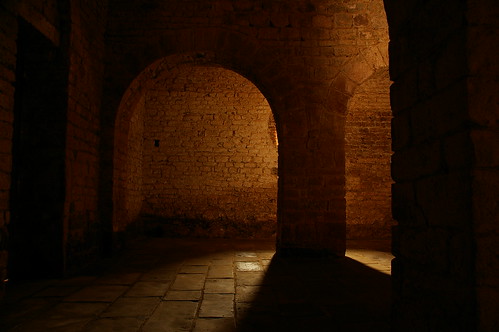Daily reflection and inspiration from the "Prince of Preachers," Charles Haddon Spurgeon.
Showing posts with label church. Show all posts
Showing posts with label church. Show all posts
Friday, November 14, 2014
The Church Of The Living God
Jehovah is the living God, and the divine life is seen in each of the adorable persons of the Godhead. Our Lord Jesus Christ is not to us a dead Christ: we love and bless him because he once died upon the cross, but we adore him because he ever liveth to make intercession for us. We are bold to preach the gospel because of his living power, and we are earnest to observe his commands because we own his living government in the midst of the church. The living God proves his life among us by the Holy Spirit, by the conversion of sinners, by comforting and instructing saints, and by edifying the faithful into a building fitly framed together. Since, then, the church belongs to the living God, what is a dead church? Is that the church of the living God? How can it be? Only as you and I possess the Spirit of God quickening us to a life of godliness may we dare to think ourselves a part of the church of the living God.
If you have never been quickened by the Spirit of God, if you are dead in trespasses and sins, what have you to do with the church of the living God? O ye dead and corrupt, how can ye have communion with the living in Zion. Only when you live unto God may you be built up as living stones into the living temple of the living God. The thing most to be dreaded in any one church is the decay of life. We may soon fall into formalism, and even hold the truth in the cold grip of spiritual death; prayer may be neglected, and the other offices of spiritual life may be disregarded, and then all will languish. “Thou hast the name that thou livest and art dead” is the dreadful sentence which must be written across the brow of a merely nominal church.
Brethren, if we would be the church of the living God, we must be thoroughly alive unto God.
From a sermon by Charles Haddon Spurgeon entitled "What The Church Should Be," delivered September 29, 1878. Image by Philip Male on Flickr under Creative Commons License, without alteration.
Labels:
Christ,
Christianity,
church,
Evangelical,
God,
Holy Spirit,
Jesus,
religion,
Spurgeon
Wednesday, October 22, 2014
Filled With Christ's Compassion
As in our Lord’s life his teaching was always connected with healing, he would have the church also take a very deep interest in the bodily sorrows of the people as well as in their spiritual needs. It will be a very great pity if ever it should be thought that benevolence is divorced from Christianity, for hitherto the crown of the faith of Jesus has been love to men; it is, indeed, the glory of Christianity that wherever it comes it erects buildings altogether unknown to heathenism - hospitals, asylums, and other abodes of charity. The genius of Christianity is pity for the sinful and the suffering.
Let the church be a healer like her Lord: at least if she cannot pour forth virtue from the hem of her garment, nor “say in a word” so that sickness may fly, let her be among the most prompt to help in everything that can assuage pain or assist poverty. So ought it to be, for “as Jesus was, so are we also in this world.” Did he not tell us, “As the Father hath sent me even so send I you.” We cannot too diligently study his character, for he has left us an example that we may follow in his steps.
From a sermon by Charles Haddon Spurgeon entitled "The Chief Physician And The Centurion's Servant," delivered June 30, 1878. Image by Steve Corey on Flickr under Creative Commons License, without alteration.
Labels:
Christ,
Christianity,
church,
compassion,
Evangelical,
healing,
Jesus,
religion,
Spurgeon
Friday, September 27, 2013
Hell's Terror and Heaven's Delight
All things which touch upon his kingdom are to be treated reverently by us for the sake of himself: his book, his day, his church, his ordinances, must all be precious to us, because they have to do with him; but in the front of all must ever stand “Jesus Christ himself,” the personal, living, loving Jesus; Christ in us the hope of glory, Christ for us our full redemption, Christ with us our guide and our solace, and Christ above us pleading and preparing our place in heaven.
Jesus Christ himself is our captain, our armor, our strength, and our victory. We inscribe his name upon our banner, for it is hell’s terror, heaven’s delight, and earth’s hope. We bear this upon our hearts in the heat of the conflict, for this is our breastplate and coat of mail.
From a sermon by Charles Haddon Spurgeon entitled "The Jesus Christ Himself," delivered December 9, 1877. Image by Jason Jenkins on Flickr under Creative Commons License.
Labels:
Christ,
Christianity,
church,
Jesus,
redemption,
religion,
Spurgeon
Friday, June 14, 2013
A People Who Know The Truth
In the present age if any man can talk well he will get a following, whatever he may teach. I am astounded at some professors, who can hear this man to-day and that man the next, though the two are diametrically opposed. Surely there is some difference between truth and error, and mere cleverness cannot neutralize false doctrine. Our forefathers discerned between things that differed, and when false doctrine came before them they cast it out, notwithstanding the eloquence of its advocate. I do not want you to be bigots. God deliver us from their bitter spirit, but I do want you to be sound believers. There is a great difference between obstinate bigotry and a decided maintenance of that which we have believed. After all, what is the chaff to the wheat? There is a difference between the doctrines of men and the teachings of the Lord. No lie is of the truth. Garnish it as you may, it is still a lie. Oh to be rooted and grounded and built up in Christ! One of the most desirable things in this fickle age is to see around the minister of Christ a people who know the truth, and feel that the truth binds them fast to their God.
From a sermon by Charles Haddon Spurgeon entitled "Taking Hold Upon God," delivered October 7, 1877. Image by Jeff Pang on Flickr under Creative Commons License.
Thursday, June 13, 2013
Built Upon One Foundation
God’s temple does not build itself, neither does man build it, but it is the sole work of God. The Spirit of God quarries out of the pit of nature the stones which are as yet dead, separating them from the mass to which they adhered; he gives them life, amid then he fashions, squares, polishes them, and they, without sound of axe or hammer, are brought each one to its appointed place, amid built up into Christ Jesus. The old heathen fabled of the music of Orpheus that it was so sweet that as he poured forth the mellifluous sounds the rocks began to dance around him, and as he continued still to play they piled themselves up into a temple at his bidding. This is true of our Lord Jesus, the music of whose divine word by the Spirit brings us stones from different parts of the fields in which we lay, and fits us together, stone to his stone, till a holy temple in the Lord arises to his praise. May the Holy Ghost work among us in this manner, and may we all become indwelt by the ever-blessed Spirit.
As you and I, who have long been brought into the church, think of how we became built upon the foundation, let us praise the hand which laid us in our place; and as we cling closer and closer to the great corner stone to whom we are always coming, let us bless him that the same love which in the beginning cemented us to the corner stone still holds us in our place so firmly that none shall separate us.
From a sermon by Charles Haddon Spurgeon entitled "The True Priesthood, Temple And Sacrifice," delivered September 30, 1877. Image by Jeff Pang on Flickr under Creative Commons License.
Tuesday, April 2, 2013
You Are The Arrows Of God
...Christian men nowadays, while they should be attached to the church to which they belong, and the more intense that attachment the better for a thousand reasons, yet they should not regard the church as being a peaceful dormitory where they are all to sleep, but a common barracks where they are all to be trained, and out of which they are to issue and carry on the sacred crusade for Christ. We are not to be frozen together with the compactness of a mass of ice, through mere agreement of creed, but welded together like bars of iron by the fire of a common purpose and a common zeal. If we are what we should be, we shall be continually breaking forth on the right hand and on the left; each man, each woman, according to the calling that God has given to us, we shall be seeking to extend the Redeemer’s kingdom in all directions.
My dear brethren, ye are arrows in the quiver, how gladly would I see you shot forth upon the enemy from the bow of the Lord. Many of you are as battleaxes and weapons of war hanging on the wall. O that you may be taken down and used of the Lord in his glorious fight. Lo, on the walls of Zion hang a thousand bucklers, all shields of mighty men; but the great need of the age is that these weapons be removed from their resting and rusting, and carried into the thick of the fray. May the Lord send you forth, O ye who have been saved under my ministry! May he hurl you forth with power divine, like a mighty hail against his adversaries. May each man among you be eager to contend earnestly for the faith once delivered to the saints and to save souls from going down into the pit. Here, then, is your permanent vocation, try to realize it.
From a sermon by Charles Haddon Spurgeon entitled "Sheep Among Wolves," delivered August 19, 1877. Image by Luis Argerich on Flickr under Creative Commons License.
Labels:
Christianity,
Christians,
church,
religion,
Spurgeon
Thursday, February 21, 2013
Grace Must Change Us
...grace must make us into silver or into golden vessels, or the Master cannot himself use us, nor can our use in the church ever be to honor. The wooden vessels in the church are very easily hacked and carved and spoiled; if a man be inclined to mischief he can put his knife to them and can cut great notches in them, ruin their character, and render them worthless. Cunning teachers can soon take away from merely nominal Christians what they professed to believe, for they are very readily cut and hacked by those who play at such games. As for the earthen vessels, how soon they are broken.
Outside of any great house there are the remains of many broken pots, which fell to the ground and went to pieces; and, I am sorry to say, we also can find enough of such relics to sadden us all. There were some in this house once who were comely to look upon, but there came a temptation and brushed them from the table, and they were shivered in a moment. Others of precious metal have endured far more shocks and tests of a severer kind, but these being only of earth were broken at once. Heaps of crockery accumulate outside every great house, and certainly outside the great house of Christ.
From a sermon by Charles Haddon Spurgeon entitled "The Great House And The Vessels In It," delivered April 8, 1877. Image by Olivier Bacquet on Flickr under Creative Commons License.
Labels:
Christianity,
church,
holiness,
religion,
sanctification,
Spurgeon
Wednesday, February 13, 2013
How The Church Flourishes
All through human history you will find the explanation of this instructive fact: let God’s truth alone, and it will take care of itself without the aid of kings and princes, laws or establishments, endowments or privileges. Only state the pure truth of revelation and it will force its own way, but garnish and adorn it by your eloquent language, or protect and guard it by your carnal wisdom and prudence, and the truth goes into captivity.
Leave the church alone, O ye kings and princes, or persecute it if ye will, for it will laugh your opposition to scorn; but pretend not to propagate its doctrines by the civil power, for this is the worst curse that can befall it. Take it under your patronage, and the mere touch of your royal hands will create disease within it. Almost to the death has the so-called “church” come down when her ministers like Hophni and Phineas, have allied themselves with the temporal power; for God will do His work by His own instruments, and in His own way; He will not be indebted to the might of the flesh, but will defend His own glory by His own mysterious power.
He uses for His instruments His consecrated ones who wear the white linen, which is the righteousness of saints, and not the blood-stained men of war arrayed in coat of mail and glittering breastplate of steel.
From a sermon by Charles Haddon Spurgeon entitled "Dagon's Ups And Downs." Image by SBA73 on Flickr under Creative Commons License.
Labels:
Christianity,
church,
God,
government,
religion,
Spurgeon
Tuesday, August 28, 2012
The Soul of Religion
What wretched communities some churches are, where the soul of religion is absent. There is a company of people called a Christian church, and a man called a minister who gives them a pious essay every Sunday morning, and they go in and out, and go home, and there is an end of the whole thing: meanwhile their neighbors are perishing for lack of knowledge, but they care nothing, the heathen are dying without Christ, but they heed it not. So much is given to the cause of God as must be paid out of sheer necessity for the maintenance of outward ordinances, but there is no zeal, no consecration, no fervor of love. May we never come down to this.
O my beloved, I long to see among us yet more and more abundantly the spirit of divine life, energetic life, fervent, self-denying life, life which consumes everything to achieve God’s glory. Beloved, ye have this and may have more of it, but ye may also lose it. Life and power may soon depart; pastor and people may alike sleep in spiritual sloth, and then at such times, the power having gone from the church, its energy is no longer felt among the unconverted. A living church grasps with a hundred hands all that comes near to it; it is a mighty soul-saving institution, which with its far-reaching nets draws thousands from the sea of death. A living church attracts even the Sabbath-breaker, and arouses the infidel. It startles those whom it does not save. When the church is in this state her converts are plenteous; then her teaching and preaching are with power, and truth pushes down its adversaries....
I tremble lest we should go to sleep, and do nothing: I am alarmed lest there should be no conversions, and nobody caring that there should be any, and yet everything seeming to be prosperous. I know that people may be growing more respectable, and appearing to be more pious than ever they were, and yet everything may be going back. God forbid that the dry rot of indifference should seize upon the heart of the church while she yet appears to be sound and strong. Before that occurs may God be pleased to take me home.
From a sermon by Charles Haddon Spurgeon entitled "And Why Not?," delivered November 12, 1876. Image by Dion Gillard on Flickr under Creative Commons License.
Labels:
Christianity,
church,
religion,
Spurgeon
Monday, June 18, 2012
God gives the Church increase
When the church is visited by the power of the Holy Spirit she is increased on every side. When a Church in the midst of a vast population remains stationary in numbers, or even becomes smaller, no man can see in such a condition the marks of God’s blessing. Certainly it would be a novel sort of benediction; for the first blessing, the blessing of Pentecost, resulted in three thousand being added to the church in one day, and we find afterwards that “The Lord added to the church daily such as should be saved.” We read in the Acts of the Apostles that the churches “walking in the fear of the Lord and in the comfort of the Holy Ghost, were multiplied.”
Ever since those early days, when the Lord has been with his people they have increased in numbers, their children have sprung up as among the grass, and as willows by the water courses. When they have been “minished and brought low” it has been because they have departed from the truth or lost their first love. The clearness of gospel testimony has been dimmed, spirituality has been at a low ebb, the Holy Ghost has been despised, and he has suspended his operations, and then the church has dwindled down till she has had little more than a name to live: but as soon as ever the Lord has returned to her she has become a fruitful mother, and her children have cried out, “the place is too strait for us, give place to us that we may dwell.” When the Lord has sent forth his power with the preaching of the gospel, converts have been as the drops of the dew and as the sands upon the sea-shore, innumerable. It is plain that one of the blessings which we as a church should seek with all our hearts is that of continual increase.
From a sermon by Charles Haddon Spurgeon entitled "Enquire Of The Lord," delivered July 9, 1876. Image by Nana B Agyei on Flickr under Creative Commons License.
Labels:
Christianity,
church,
Holy Spirit,
religion,
Spurgeon
Wednesday, May 2, 2012
Prayer is your Weapon!
“Praying in the Holy Ghost” is the weapon with which the hosts of the Lord will put to rout the armies of the alien. The prayers of saints are the mighty artillery with which the walls of our Jerusalem are protected. Supplication is a cannon which throws tremendous bolts against the advancing foe, as Sennacherib knew when Hezekiah pleaded with God. The prayers, however, must be deeply spiritual, written on the heart by the Holy Ghost, and presented with energy of his creating. Formal, lifeless petitions are but a Chinese painted fortress, but praying in the Holy Ghost is an impregnable castle.
Those “groanings which cannot be uttered” are pieces of ordnance which make the gates of hell to tremble. But we must put our hearts under the influence of the blessed Spirit of God and then lift them up in continued intercession before God, and there can be no fear about the preservation of our minds from the error of the wicked. A praying church soon tries the spirits of false prophets, and casts them forth as evil. I have far more faith in prayer than in controversy. Keep the prayer meetings right, maintain private prayer with earnestness, and we may laugh to scorn all the sophisms of unbelievers and deceivers.
From a sermon by Charles Haddon Spurgeon entitled "A Weighty Charge," delivered March 26, 1876. Image by Stephen Heron on Flickr under Creative Commons License.
Labels:
Christianity,
church,
God,
Holy Spirit,
intercession,
prayer,
religion,
Spurgeon,
supplication
Monday, March 26, 2012
Patience In Persecution
Never was the victory of patience more complete than in the early church. The anvil broke the hammer by bearing all the blows that the hammer could place upon it. The patience of the saints was stronger than the cruelty of tyrants. Christ then, the immortal Christ, was stronger than all the pangs of death, and they triumphed though they were slain. Truly did the apostle say, “In all these things we are more than conquerors through him that loved us.” The secret reason for the triumph of Christians in those circumstances was their confidence in Christ. Brethren and sisters, we are not subjected to the like persecution, and it will not do for us to wrap ourselves about with the garments of our ancestors and to say that Christians are this and that, as though we were to be honored without enduring trial. Yet, remember, there are still conflicts for you.
If you be real Christians you will have to endure the trial of cruel mockings. In some cases family ties are the source of far greater sorrow than comfort: truly is it written, “A man’s foes shall be they of his own household.” The coming of the gospel into a man’s heart has often rendered him the object of hatred to those who loved him before. In his own house, and in society abroad, the Christian working man has at this day to run the gauntlet much more severely than some suppose; and in almost every sphere of life the genuine Christian meets with the “cold shoulder” and the sneer, and sometimes with cruel misrepresentation and slander; for, until the hearts of men are changed, persecution in some form or other will continue. Those that are born after the flesh will always persecute those that are born after the Spirit.
From a sermon by Charles Haddon Spurgeon entitled "Hold Fast Your Shield." Image by Thaddeus Roan on Flickr under Creative Commons License.
Labels:
Christ,
Christianity,
Christians,
church,
patience,
persecution,
religion,
Spurgeon
Saturday, March 17, 2012
When We All Arrive
Where will some of the vessels I see before me go? It is a fine fleet I am looking upon. Brothers and sisters, I hope all of us will be found in that great harbour in heaven which can accommodate all his Majesty’s fleet. Oh, it will be a great day when we all arrive. Will you give me a hail when you get into port? Will you know me? I shall look out for some of you. I cannot help believing that we shall know each other. We have been in rough waters together these twenty years, and we have had some glorious weather too, have we not? We have seen the works of the Lord and his wonders in the deep: I hope we shall keep together till we reach that blessed haven, where our fellowship will be eternal. How we will glorify him who gets us there, even Jesus, the Lord High Admiral of the seas. Christ shall never hear the last of it if I get to heaven. I will sing, yea, I will sing praises unto his name.
From a sermon by Charles Haddon Spurgeon entitled "There Go The Ships." Image by nosha on Flickr under Creative Commons License.
Friday, March 16, 2012
Only through much tribulation
The Christian man must not expect to go to heaven without opposition. A soldier who never meets an enemy at all is not renowned.... The man who is scarred and gashed, maimed and wounded, he is the hero to whom men pay homage. You must fight if you would reign. Your predecessors swam through seas of blood to win the crown; and, though the form of battle may be changed, yet the spirit of the enemy is unaltered; you must still contend against sin and bear up under trouble, for only through much tribulation will you inherit the kingdom of God.
It is a warfare, brethren, for all these reasons, and yet more so because we must always be upon the watch against danger. In a battle no man is safe. Where bullets fly, who can reckon upon life a moment? Brethren, the age is peculiarly dangerous. Perhaps every preacher before me has said as much, and every preacher after me will say the same for his times — yet still, I say, in this peculiar age there are a thousand perils for the soul, from superstition on the one hand and scepticism on the other; from rude self-reliance and indolent trust in others, from a wicked world and an apostate church. You must not wonder that it is so, for war is raging. The enemy has not laid down his weapons, the war drum is still beaten; therefore do not lay down your arms, but fight manfully for your King and country — for Christ and for his church.
From a sermon by Charles Haddon Spurgeon entitled "The Hand Of God In The History Of A Man," delivered October 10, 1875. Image by nosha on Flickr under Creative Commons License.
Labels:
Christianity,
Christians,
church,
religion,
Spurgeon,
tribulation
Saturday, March 10, 2012
That wonderful gift
The last gift he gave them was, he breathed on them. His breath was the Spirit of God. This was the first drop of the shower of the Spirit which afterwards so plenteously at Pentecost. He breathed on them, and though they did not get the fullness of the Spirit thereby yet they obtained a measure of it, and they became qualified to fulfill their commission. Oh that he would breathe the Spirit upon us now! Nay, we need not ask for it, beloved, for our Lord has given the Spirit once for all to all his people. He has baptised his church into the Holy Ghost, and into fire, and the Spirit remaineth with us evermore, only ye must believe the might which that Spirit bestows upon you.
Oh brother, oh sister, I beseech thee do not estimate thyself according to thine ability, according to thine experience, thy learning, and the like, but according to that divine energy which rests upon thee, if thou be called of God to service. What are the powers within? they are feebleness itself, but the power from above is the power of God. Gird on this mystic belt, this divine omnipotence, and if thou knowest how to wear it by faith thou shalt break through a troop and leap over a wall. “All things are possible to him that believeth.”
From a sermon by Charles Haddon Spurgeon entitled "Jesus In Our Midst," delivered September 12, 1875. Image by nattu on Flickr under Creative Commons License.
Labels:
Christianity,
church,
Holy Spirit,
Jesus,
religion,
Spurgeon
Tuesday, March 6, 2012
Encourage the young
A few words to a young Christian will be very greatly helpful to him, and his weakness craves them. Those of us who have been a long while in the Lord’s ways ought to be ashamed if we are gruff, and sour, and critical. You know it was the elder brother, not one of the younger ones, who said, “This thy son hath come, who hath devoured thy living with harlots,” and so on. Do not degenerate into the elder brother’s spirit, I pray you. You must grow older in years, but endeavor to remain young at heart.
There is a tendency to look for too much in young converts, and to expect in them a great deal more than we shall ever see. This is wrong. We shall not do them much good by criticizing them, but we may greatly benefit them by encouraging them.... There is nothing like a cheer to a fellow when he feels faint... Give the weak brother a cheer, I say. When you meet with a young believer who is tossed about, give him a cheer; give him a hearty cheer. Tell him some choice promise, tell him how the Lord helped you. Your few words may not be much to you, but they will be very much to him; whereas the black look, which, perhaps, you really did not mean, may chill him to the very marrow of his bones. Many a poor young Christian has been frostbitten by the coldness of stern professors. Let us make a rule to encourage the young and help them forward, for that work of encouragement may affect the whole of their future history.
From a sermon by Charles Haddon Spurgeon entitled "The First Day Of Creation," delivered August 29, 1875. Image by JR Guillaumin on Flickr under Creative Commons License.
Labels:
Christianity,
church,
encouragement,
religion,
Spurgeon
Friday, March 2, 2012
What a meeting it will be!
We shall be quite at home in heaven, when we get there. Some of you have more friends in heaven than on earth. How few are left of your former friends, compared with the many who have gone above. In the day when you enter into heaven, you will perceive that the church is one family, for they will welcome you heartily, and recognize in you a brother, and a friend, and so, together with them, you shall adore your Lord.
Remember there is coming another day in which the family union of the church will be seen, and that is when the trumpet shall sound and the dead shall be raised. It may be that we shall all be of the company of those who sleep, and if so, when the trumpet sounds, the dead in Christ shall rise first, and we shall have our share in the first resurrection. Or, if our Lord should come before we die, we shall be “alive and remain;” but we shall undergo a change at the same moment as the dead are raised, so that this corruptible shall put on incorruption. What a family we shall be when we all rise together, and all the changed ones stand with us, all of one race, all regenerate, all clothed in the white robe of Jesus’ righteousness! What a family! What a meeting it will be!
From a sermon by Charles Haddon Spurgeon entitled "Saints In Heaven And Earth One Family," delivered August 8, 1875. Image by Satoru Kikuchi on Flickr under Creative Commons License.
Wednesday, February 29, 2012
Nothing will compensate for a lack in prayer
Let it be a standing ordinance in the church that at certain times and occasions many shall meet together to pray, and supplication shall be their sole object. The private Christian will read, and hear, and meditate, but none of these can be a substitute for prayer: the same truth holds good upon the larger scale, the church should listen to her teachers, and receive edification from gospel ordinances, but she must also pray; nothing can compensate for the neglect of devotion.
From a sermon by Charles Haddon Spurgeon entitled "The Special Prayer Meeting," delivered July 20, 1875. Image by ankakay on Flickr under Creative Commons License.
Labels:
Christianity,
church,
prayer,
religion,
Spurgeon
Wednesday, February 22, 2012
The Importance of Unity
We can dispense with uniformity if we possess unity: oneness of life, truth, and way; oneness in Christ Jesus; oneness of object and spirit — these we must have, or our assemblies will be synagogues of contention rather than churches of Christ. The closer the unity the better; for the more of the good and the pleasant there will be. Since we are imperfect beings, somewhat of the evil and the unpleasant is sure to intrude; but this will readily be neutralized and easily ejected by the true love of the saints, if it really exists.
Christian unity is good in itself, good for ourselves, good for the brethren, good for our converts, good for the outside world; and for certain it is pleasant; for a loving heart must have pleasure and give pleasure in associating with others of like nature. A church united for years in earnest service of the Lord is a well of goodness and joy to all those who dwell round about it.
From "The Treasury Of David," by Charles Haddon Spurgeon, exposition of Psalm 133. Image by Earl Wilkerson on Flickr under Creative Commons License.
Tuesday, January 31, 2012
A Marked Difference
Dear Brethren, it is to be feared that many of us are not separated enough from the world. God intends the difference to be very marked; he would have the line between the church and the world drawn very clearly. I could wish to obliterate for ever the unhappy and artificial distinction which is constantly made between sacred and secular, for a world of mischief has come out of it. The truth is that a real Christian may be known by this, that to him everything secular is sacred, and the commonest matters are holiness unto the Lord. I do not believe in the religion which only lifts its head above water on Sunday, and confines itself to praying and preaching and carrying hymn books about: we must have a religion which gives a true yard when it is measuring its calicoes, a religion which weighs a true pound when it is dealing out shop goods, a religion which scorns to puff and lie, and take advantage of a gullible public, a religion which is true, upright, chaste, kind, and unselfish.
Give me a man who would not lie if all the whole earth or heaven itself were to be won thereby. We need among professed Christians a high morality; nay, far more, we need unsullied holiness. O, Holy Spirit, work it in us all! As we have often said, holiness means wholeness of character in contradistinction to the cultivation of some few virtues and the neglect of others. Oh that we were like the Lord in this, that we loved only that which is right, and abhorred that which is evil; that we kept along the straight and narrow path, and could not be decoyed from it, fearing not the frown of man nor courting his smile, but resolved as God lives in us that we will live in our daily actions according to his will. This would make Christians to be indeed a separated people, and this is precisely what their God would have them to be.
From a sermon by Charles Haddon Spurgeon entitled "Solomon's Plea," delivered May 2, 1875. Image by Eric Bryan on Flickr under Creative Commons License.
Subscribe to:
Posts (Atom)



















